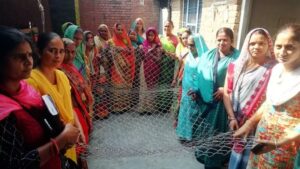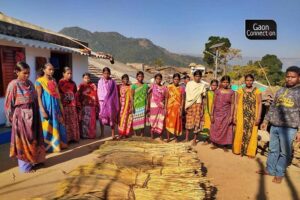Ramniwas Meghwal, a resident of Jasnagar in Nagaur district of Rajasthan, is a happy man. Finally, his son, Samrat, a class III student at the government primary school, Jasnagar, will not have to suffer the intense summer heat of the desert state.
For the first time, Samrat’s classroom will have fans that work, as the school has just been supplied with electricity. “We had never thought it possible that a government school would have electricity,” Meghwal told Gaon Connection.
There are 839 government schools of the total 910 schools in Nagaur district that lies 235 kilometres from Jaipur the state capital, which received electricity in the last six months while the state was also battling COVID-19. The balance 71 schools will be electrified by March 2021.
Electrification of schools is a dream come true thanks to a special scheme called ‘Ujas’ initiated by the district magistrate of Nagaur, Jitendra Kumar Soni. Remarkably, the initiative has been a huge success thanks to the public participation where 80 per cent of the cost of electrification was contributed by the people of the district while the government furnished the balance 20 per cent.
“So far, more than one crore rupees have been received from them. We are also trying to provide computers to all schools,” Soni told Gaon Connection.
The schools were shut at the time of the implementation of the Ujas scheme, yet that did not come in the way of the scheme gathering scheme at the height of the pandemic in July-August 2020.
“In our village, everyone donated as much as they could. The school now has fans and lights. In future, our children may also be able to learn computers at this government school,” hoped Meghwal.
The success of the Ujas campaign was lauded by Rajasthan chief secretary, Niranjan Arya who issued a letter in January 2021 to district magistrates across the state to launch the Ujas scheme. Even today, out of the total 64,093 government schools in the state, 11,154 schools are deprived of electricity.
Every Tuesday district magistrate Soni met up with the local district authorities at the block or panchayat level, the panch-sarpanch and big business houses that willingly came forward to help fund the project.
“For the first time since Independence, the government schools in the remote districts and villages have got electricity through public support,” Sampatram, Nagaur’s chief district education officer, told Gaon Connection. Forty per cent schools of the district did not have electricity and most of them were so remotely located that it was difficult to reach electricity there, he said. “In numerous places, the local sarpanchs took full responsibility and helped accomplish the task,” he added.
For instance, Nizamuddin, the sarpanch of Bhomasar panchayat in Nagaur district, contributed Rs 33,200 towards the electrification of the government school in his village. “It is our own children who study in these schools. We must try to attend to their needs. If we do, we will not have to wait for years for government help,” he said.
Anita Purmia, a teacher from government primary school at Sidrana, Nagaur, while being happy that electricity had reached her school, hoped that the government would minimise the electricity bills the schools would now have to pay.
Blueprint for electrifying schools
The process of electrifying the schools began with block level officers compiling a list of the schools that did not have electricity. Thereafter, the power department provided the estimated cost of electrifying the schools. Based on the requirement of a school, the power department finalised the power consumption and cost for it.
Each school thereafter submitted a demand draft to the power department. “This is a campaign which involves the participation of every officer in the district; the follow-up is very important for its successful implementation,” pointed out Soni, who was posted to Nagaur last July.
District magistrate Soni has been involved with several initiatives in the past. Significantly, they have all enjoyed huge success thanks to his ability to motivate the people to participate in them actively.
In 2014, he launched the Charan PadukaAbhiyan campaign to provide footwear for every student in government schools. A survey conducted at Jalore prior to the campaign revealed that thousands of children came barefoot to school. Donations were sought from the public through meetings and Facebook appeals and by January 26, 2016, the campaign provided footwear to 25,000 children. The campaign was later implemented throughout the state.



















